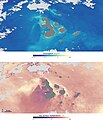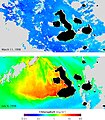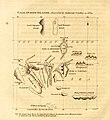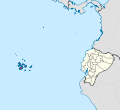Introduction
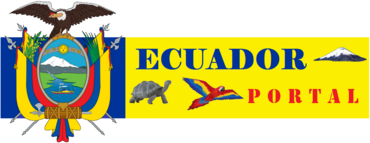 Ecuador, officially the Republic of Ecuador, is a country in northwestern South America, bordered by Colombia on the north, Peru on the east and south, and the Pacific Ocean on the west. Ecuador also includes the Galápagos Islands in the Pacific, about 1,000 kilometers (621 mi) west of the mainland. The country's capital is Quito, but its largest city is Guayaquil. The territories of modern-day Ecuador were once home to a variety of indigenous peoples that were gradually incorporated into the Inca Empire during the 15th century. The territory was colonized by Spanish Empire during the 16th century, achieving independence in 1820 as part of Gran Colombia, from which it emerged as a sovereign state in 1830. The legacy of both empires is reflected in Ecuador's ethnically diverse population, with most of its 17.8 million people being mestizos, followed by large minorities of Europeans, Native American, African, and Asian descendants. Spanish is the official language spoken by a majority of the population, although 13 native languages are also recognized, including Quechua and Shuar. Ecuador is a representative democratic presidential republic and a developing country whose economy is highly dependent on exports of commodities, primarily petroleum and agricultural products. The country is a founding member of the United Nations, Organization of American States, Mercosur, PROSUR, and the Non-Aligned Movement. According to the Center for Economic and Policy Research, between 2006 and 2016, poverty decreased from 36.7% to 22.5% and annual per capita GDP growth was 1.5 percent (as compared to 0.6 percent over the prior two decades). At the same time, the country's Gini index of economic inequality improved from 0.55 to 0.47. One of 17 megadiverse countries in the world, Ecuador hosts many endemic plants and animals, such as those of the Galápagos Islands. In recognition of its unique ecological heritage, the new constitution of 2008 is the first in the world to recognize legally enforceable rights of nature. ( Full article...) Selected article -Rumicucho or Pucara de Rumicucho is an archaeological site of the Inca Empire in the parroquia of San Antonio de Pichincha, in Quito Canton, Pichincha Province. Ecuador. Rumicucho is a pucara (hilltop fortress) located 23 kilometres (14 mi) in a straight-line distance north of the city of Quito at an elevation of 2,401 metres (7,877 ft). Rumicucho in the Quechua language means "stone corner", perhaps referring to its strategic location between the territory of the Yumbo people to the east and the chiefdoms of the Pais Caranqui to the north. The Incas probably built Rumicucho between 1480 and 1500 and ruled this area until the Spanish conquest in the 1530s. ( Full article...)CategoriesEcuador Articles
General images -The following are images from various Ecuador-related articles on Wikipedia.
Did you know -
Related portalsWikiProjectsThings you can do
For more information on how you can help, see the WikiProject Ecuador. Ecuador topicsAssociated WikimediaThe following Wikimedia Foundation sister projects provide more on this subject:
SourcesDiscover Wikipedia using
portals | |||||||||||||||||||||||||||||||||||||||||||||||||||||||||||||||||||||||||||||||||||||||||||||||||||||||||||||||||||||||||||||||||||||||||||||||||||||||||||||||||||||||||||||||||||||||||||||||||
Introduction
 Ecuador, officially the Republic of Ecuador, is a country in northwestern South America, bordered by Colombia on the north, Peru on the east and south, and the Pacific Ocean on the west. Ecuador also includes the Galápagos Islands in the Pacific, about 1,000 kilometers (621 mi) west of the mainland. The country's capital is Quito, but its largest city is Guayaquil. The territories of modern-day Ecuador were once home to a variety of indigenous peoples that were gradually incorporated into the Inca Empire during the 15th century. The territory was colonized by Spanish Empire during the 16th century, achieving independence in 1820 as part of Gran Colombia, from which it emerged as a sovereign state in 1830. The legacy of both empires is reflected in Ecuador's ethnically diverse population, with most of its 17.8 million people being mestizos, followed by large minorities of Europeans, Native American, African, and Asian descendants. Spanish is the official language spoken by a majority of the population, although 13 native languages are also recognized, including Quechua and Shuar. Ecuador is a representative democratic presidential republic and a developing country whose economy is highly dependent on exports of commodities, primarily petroleum and agricultural products. The country is a founding member of the United Nations, Organization of American States, Mercosur, PROSUR, and the Non-Aligned Movement. According to the Center for Economic and Policy Research, between 2006 and 2016, poverty decreased from 36.7% to 22.5% and annual per capita GDP growth was 1.5 percent (as compared to 0.6 percent over the prior two decades). At the same time, the country's Gini index of economic inequality improved from 0.55 to 0.47. One of 17 megadiverse countries in the world, Ecuador hosts many endemic plants and animals, such as those of the Galápagos Islands. In recognition of its unique ecological heritage, the new constitution of 2008 is the first in the world to recognize legally enforceable rights of nature. ( Full article...) Selected article -Rumicucho or Pucara de Rumicucho is an archaeological site of the Inca Empire in the parroquia of San Antonio de Pichincha, in Quito Canton, Pichincha Province. Ecuador. Rumicucho is a pucara (hilltop fortress) located 23 kilometres (14 mi) in a straight-line distance north of the city of Quito at an elevation of 2,401 metres (7,877 ft). Rumicucho in the Quechua language means "stone corner", perhaps referring to its strategic location between the territory of the Yumbo people to the east and the chiefdoms of the Pais Caranqui to the north. The Incas probably built Rumicucho between 1480 and 1500 and ruled this area until the Spanish conquest in the 1530s. ( Full article...)CategoriesEcuador Articles
General images -The following are images from various Ecuador-related articles on Wikipedia.
Did you know -
Related portalsWikiProjectsThings you can do
For more information on how you can help, see the WikiProject Ecuador. Ecuador topicsAssociated WikimediaThe following Wikimedia Foundation sister projects provide more on this subject:
SourcesDiscover Wikipedia using
portals | |||||||||||||||||||||||||||||||||||||||||||||||||||||||||||||||||||||||||||||||||||||||||||||||||||||||||||||||||||||||||||||||||||||||||||||||||||||||||||||||||||||||||||||||||||||||||||||||||















